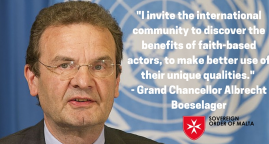Why We Need a Global Business Council for Refugees
Article published on newsdeeply website on 06/28/2017 by Ziad Haider
The private sector should establish a Global Business Council for Refugees to better coordinate their initiatives, motivate more support and advocate for better policies for refugees, argues the Center for Strategic and International Studies’ Ziad Haider in Devex.
As the largest wave of human displacement since World War II continues to unfold, World Refugee Day last week served as a grim milestone and stark reminder of the inadequacy of the international community’s response to date. An all-hands-on-deck response is required and must be scaled up. That means further action not just by governments and humanitarian agencies, but also by the private sector.
Companies around the world are starting to respond. Yet they must augment their efforts by establishing a Global Business Council for Refugees to better coordinate their initiatives, mobilize their peers to act and amplify their advocacy on behalf of refugees.
According to the United Nations Refugee Agency, 65.6 million people were forcibly displaced worldwide at the end of 2016 – a total bigger than the population of the United Kingdom. Within that group, refugees topped 22.5 million. Scattered across the globe, they are straining borders, budgets and communities; their plight invokes our common sense of humanity. While the Syrian crisis has captured the world’s attention, it is only one of several mass displacements.
In light of the scale of the crisis, the rationale for private sector engagement is clear. Companies can contribute to the humanitarian response with agility and ingenuity given the budgetary constraints and inability or unwillingness of many governments to do so. From Coursera connecting refugees to its online education programs, to Mastercard providing them with pre-paid cards, U.S. firms are deploying their innovative services and products for good.
Yet a paradigm shift is underway, from viewing refugees through a humanitarian lens to a development lens with jobs at the core. Given refugees are often displaced for decades from their homes, a sustainable response requires integrating them into their host economies – generating economic output for the host country and an income and sense of dignity for the refugees.
“All I want is to get a job to support my family,” one mechanic shared with me at a refugee center in Berlin last March following a harrowing journey to flee Syria’s brutal civil war across seven countries in 25 days with his wife and 16-month-old child. The sentiment was echoed by a dentist from Syria at the center who was enrolled in a certification program to practice in Germany.
The private sector has a central role to play in this new paradigm by tapping the spirit and the skills of refugees.
This entrepreneurial spirit is on display in the Zaatari refugee camp in Jordan where Syrian refugees have established 3,000 small businesses, including one selling furniture made from the slats of temporary housing containers. Engineers, healthcare workers and other professionals are surfacing through the work of organizations such as Talent Beyond Boundaries, which has created “talent catalogues” mapping the skills of refugees in Lebanon and Jordan. Employers as far away as Australia are now accessing the catalogue online. In France, Action Emploi Refugees is similarly connecting skilled refugees with employers. In the United States, nearly half of the adult refugees arriving in the United States have a college education, according to Upwardly Global, an organization that helps refugees find jobs and has placed accountants to journalists.
Recognizing the role of the private sector, last year the State Department actively developed a partnership with U.S. firms to respond to the refugee crisis. In September, 51 U.S. companies announced their commitments to educate and hire 300,000 refugees on the margins of a U.N. summit on the refugee crisis co-chaired by the United States. Fifty-two heads of state in attendance announced their countries’ commitments to increase their financial contributions to international humanitarian organizations, double the number of refugees they resettle, and improve access to education for 1 million refugee children and to lawful work for 1 million adults. Four months later, the Trump administration abdicated this leadership role by curbing refugee resettlement in the United States – let alone sustaining private sector outreach.
Fortunately, companies continue to rise to the challenge. Following the Trump administration’s executive order on refugee resettlement, Starbucks announced that it would welcome and employ 10,000 refugees “whose talent, experience and resilience will enrich the communities we serve around the world.” This month, Airbnb, the online vacation rental company, announced a new platform for housing refugees.
Companies are also beginning to coordinate their efforts. In Germany, Ernst & Young is convening business roundtables with more than 50 firms to develop a strategy for skilling and hiring refugees in Germany. In the United States, the Tent Foundation – the philanthropic arm of the Chobani yogurt company – has created a similar mechanism known as the Tent Partnership for Refugees that is bringing together key U.S. companies to support displaced persons globally. The Global Business Council for Education’s initiatives include educating refugee children.
Even as these efforts should be sustained, greater synergies and outputs can flow by standing up a Global Business Council for Refugees. Precedent exists for such a structure. In response to the HIV/AIDS pandemic, the business community rallied to form the Global Business Coalition on HIV/AIDS. The council’s achievements included the development of a CEO pledge to end workplace HIV stigma and discrimination that was signed by more than a hundred CEOs; advocating for the successful repeal of the U.S. HIV travel ban; and helping hundreds of firms develop their global health programs. A council focused on refugees could similarly serve five key functions.
First, the council could be the global clearinghouse for companies keen to support skill, or hire refugees. Many companies that my colleagues and I engaged with often did not know how to deploy their products and services to support refugees. Hearing what their peer companies were doing was a creative and competitive spur. Along with plugging information gaps, the council could connect firms to supplement and scale up their efforts and thus avoid duplication of effort.
Second, the council could serve as a focal point for governments, international organizations and NGOs seeking industry partners in key initiatives. The council, for example, could help direct its members’ attention to a European Union-Jordan trade deal that reduces duties on products made by Jordanians and refugees – an opportunity for firms to do well and do good. Current efforts to rally attention to the trade deal entail individual outreach to companies. A partner entity that can rapidly reach companies predisposed to engaging on refugee issues would fill an important gap.
Third, the council could strengthen the network of companies supporting refugees. It could facilitate dialogues among existing national networks so that businesses in Germany could discuss best practices on hiring refugees with companies in France or the United States. As an umbrella entity, it could also help stand up networks in countries where they do not exist while ensuring flexibility for each network to pursue initiatives tailored to its local circumstance.
Fourth, the council could be a key voice for advocacy, shaping policies ranging from resettlement to humanitarian funding and action where governments falter. Such private sector advocacy and action has been on display following the Trump administration’s withdrawal from the Paris climate agreement; and it is sorely needed given the administration’s retreat on refugee issues.
Coupling advocacy with acclaim, the council could also spotlight members that have shown leadership in response to the refugee crisis and motivate others to act. The U.S. government has recognized such efforts. In January, McDonald’s Germany was a recipient of the Secretary of State’s Award for Corporate Excellence for employing 900 refugees in Germany since 2015. Such sustained recognition on a peer basis in the private sector could be a valuable call to action.
For such a council to materialize, a visionary group of corporate leaders must step forward with support from governments, international institutions and NGOs. Effective operation will require creating a secretariat to coordinate member activities; interface with partners; and, importantly, provide an analytical basis for member interventions, for example, mapping the skills of refugees more holistically to enable employment efforts or developing best practices for hiring refugees.
This is entirely possible. Having witnessed firsthand the groundswell of corporate leadership in response to the refugee crisis, what is needed is to channel these initiatives into a structure and augment them commensurate to the scale and gravity of the crisis. A Global Business Council for Refugees can do just that. More than an entity, it is an idea whose time has, tragically, come.
Related Articles
Highlights of the Sovereign Order of Malta’s participation at the WHS
05/26/2015. 9000 participants came together to reshape the field of humanitarian action.
How Europe Can Reform Its Migration Policy : The Importance of Being Sustainable
10/05/2018. Three years since the start of the European refugee crisis, the continent’s politics are still convulsed by disagreements over migration.
Pope: Protect Civilians During Conflicts
10/28/2017. Audience with Participants in Third Conference on Humanitarian International Law.





